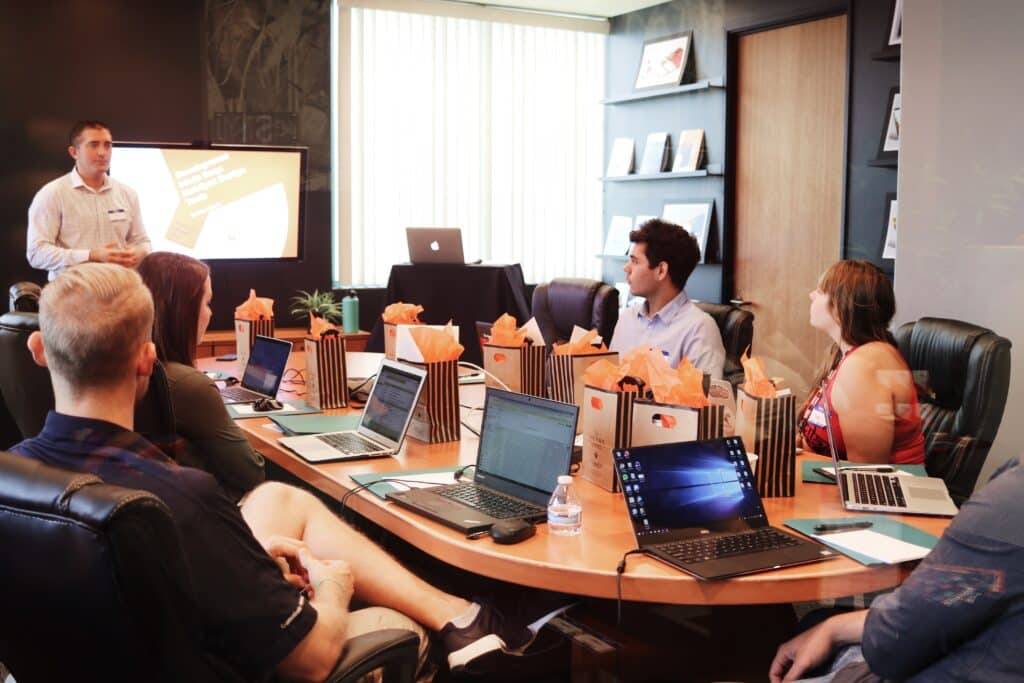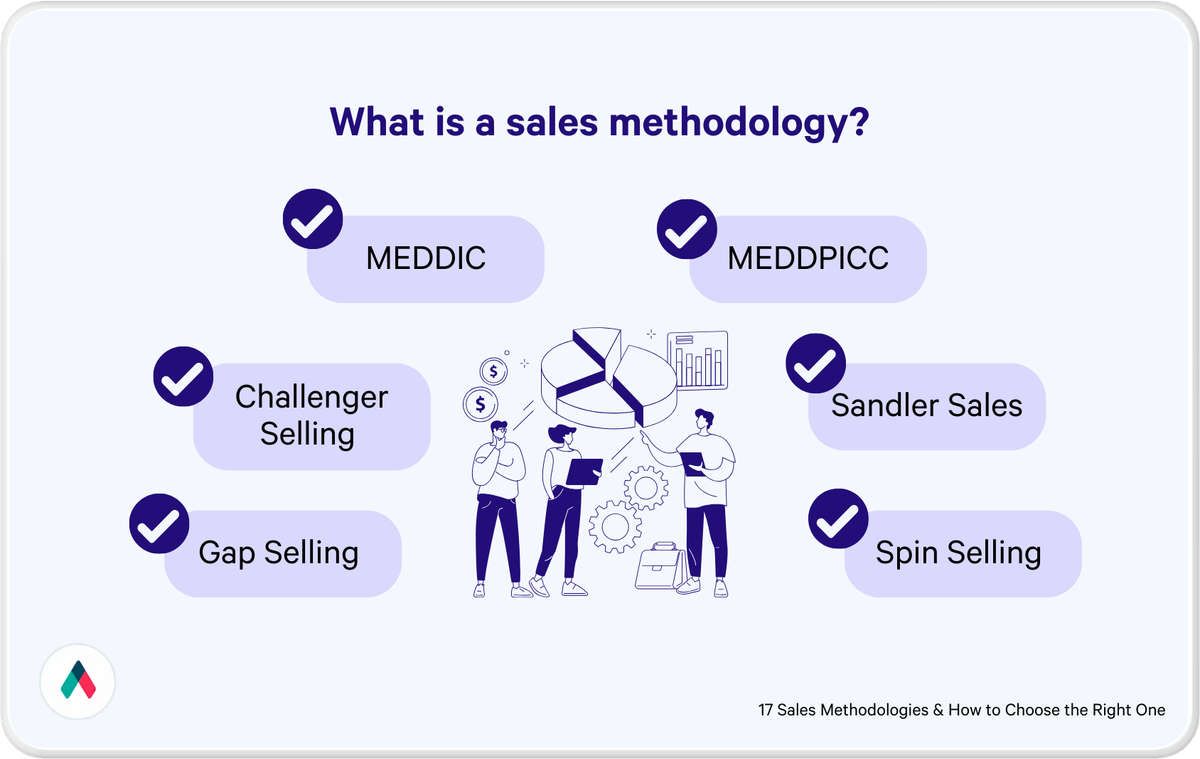A lot of sellers have a goal of becoming a high ticket closer, and for good reason. This type of sales is a high ROI, low volume form of sales that can be incredibly lucrative for those with the right skills and mindset. The sales tactics needed to close this type of deal are very different than the ones used to sell lower-ticket everyday items.
High-quality products often have the high ticket price tag; this could be anything from flashy cars or luxury goods to boutique consulting services, concierge healthcare plans, or custom software.
Like most desirable things, high ticket closing isn't easy. On average, only 50% of all high tickets are closed.
What makes the difference between the successful ones and the not-so-successful ones -- and how do you replicate that success?
What is high ticket closing?
High ticket closing is how salespeople close deals on high-priced products or services. Unlike low ticket closing (which focuses on small, low-priced items), high ticket closing is all about selling expensive products or services that require a significant financial investment from the buyer.
Why high ticket closing?
There are many reasons to look at high ticket closing as your strategy, but some of the most common include:
- Less context switching: High ticket closing is all about high quality (rather than quantity.) Instead of chasing multiple small sales, you can focus on closing one or two high-ticket deals and still make a considerable profit margin.
- More control: Since high ticket closing involves dealing with clients who can afford to make a big investment, theoretically, they are less likely to haggle or negotiate for lower prices. This gives you more control over the sales process and lets you focus on building a strong relationship with your client.
- Higher earnings potential: If you can master the art of high ticket closing, your earnings potential is virtually unlimited. With each closed deal comes a higher commission or profit, which can quickly add up to significant income.
- Opportunity for specialization: High ticket closing often involves selling niche or specialized products or services. This provides the opportunity for you to become an expert in a particular field and develop a reputation as the go-to person for that industry.
Key differences between high ticket and low ticket closing
The simplest way to look at it is that the main difference between high ticket and low ticket closing lies in your product or service's cost. Is it a relatively small investment, or are you selling something with a five-, six-, or seven-digit price tag? From this, multiple other key differences emerge.
For instance, the high price point of a high-ticket item means that potential buyers will require more convincing and nurturing to close the deal. On the other hand, low-ticket items are often impulsive purchases or things that people need on a regular basis, making it easier to close the sale.
Additionally, high ticket closing tends to require different sales methodologies and a longer sales cycle, while low ticket closing can often be done with a quick pitch or demonstration. For example, a car salesman may spend days or even weeks working with a potential buyer to close the sale, while someone selling groceries can likely close the deal on a new snack in just a few seconds.
In terms of time investment, low ticket selling might seem like the better choice. But it's worth considering that with low ticket sales, you need to close many deals to make the same atmount of income as a successful high ticket sales closer. Plus, if the price of the product or service is very low, churn rates might be higher, which means you'll need to constantly work on finding new customers.
The process of high ticket closing
Although each company and sales rep might have a slightly different process, the main steps are usually very similar:
Initial contact
High ticket sales typically involve a more personalized approach, so the initial contact is critical. This could happen through various channels, such as email, phone calls, or in-person meetings.
Qualifying the prospect
Not every potential buyer will be a good fit for your high ticket product or service. That's why it's essential to qualify your prospects and ensure they have the means and interest to make a significant investment at this time. When qualifying a prospect, a rep might learn that they aren't quite ready to invest, but might be able to follow up at a more appropriate time.
Building relationships
High ticket closing is all about building trust and relationships with your prospects. This stage may involve multiple interactions, presentations, or demonstrations to showcase the value of your product or service. It may also involve sharing resources (educational materials) or even attending social events with your prospect.
Nurturing
After the initial contact and relationship building, you must continue nurturing your prospects. This could include answering questions, addressing concerns and objections, providing additional information or resources, and even offering a taste of your product or service through a free trial or demo.
Pitching
The pitch is when you present your product or service and ask for the sale. This step requires strong communication skills, persuasive techniques, and a deep understanding of your prospect's needs and pain points.
Sales proposal
Once the pitch is done, it's time to present a formal sales proposal that includes your product or service details, pricing options, and any other relevant information. This proposal should be tailored to fit the needs and preferences of your prospect.
If you are looking for a quick, efficient, and seamless way to create your sales proposal, give Qwilr a go -- you can create aesthetic sales proposals in minutes, include eSignature fields in the proposal, and track when clients open and interact with it.
Closing the deal
The final step is closing the deal by sealing the agreement and receiving payment. This could involve negotiating terms, finalizing contracts, or any other actions necessary to complete the sale successfully.
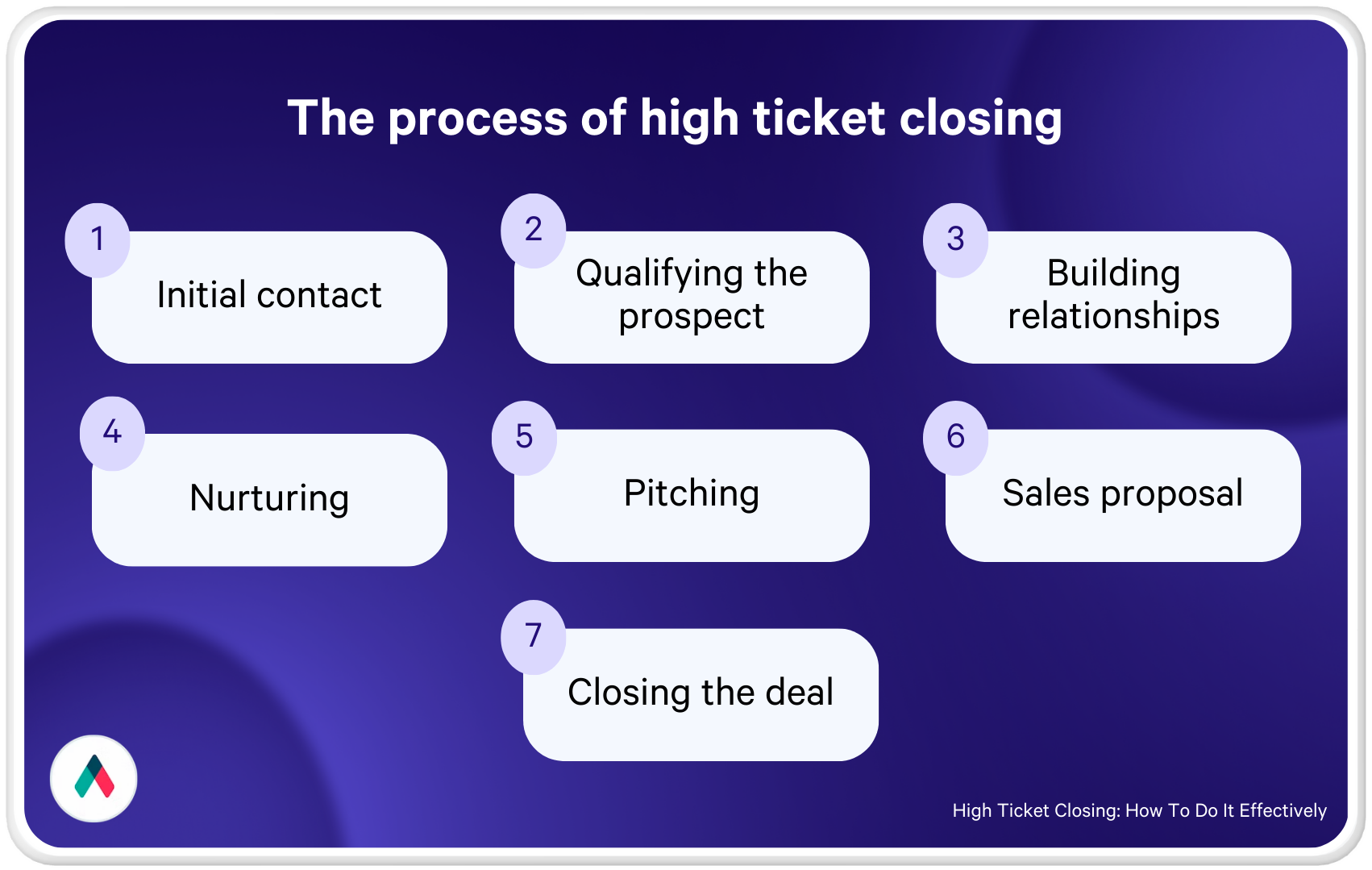
Roles involved in high ticket closing
High ticket closing is rarely the work of just one person -- it's a team effort, usually comprised of two people: the appointment setter and the closer. Here's what each of them should do:
The appointment setter
The appointment setter connects with a lead, qualifies them, and schedules an appointment for the closer to meet with them. They are typically skilled communicators, able to build rapport quickly and gather essential information about the prospect's needs.
The closer
The closer is the sales representative responsible for the final stages of the sales process, including relationship building, pitching, negotiating terms, and closing the deal. They should be highly persuasive, have exceptional communication skills, and easily handle objections.
Skills required for high ticket closing
If you want to focus on high ticket closing, here are some of the essential sales skills you'll need to develop:
Confidence and charisma
High ticket closers exude confidence -- not in annoying, smug, or arrogant ways, but with genuine self-assurance and charisma. This helps "hook" and build trust and credibility with prospects. It's often believed that a person needs to be extroverted to be a good high ticket closer, but that isn't the case. More and more we're seeing introverts succeed in high ticket sales situations.
Understanding client needs
Good high ticket closers also find ways to truly understand what their customers need. They do their homework; they can see beyond the obvious and anticipate the client's real needs or the root cause of their pain points.
Communication
High ticket closers should be great communicators, picking up on cues from the client and adapting their approach accordingly. They know how to listen actively, how to embrace brevity, and how to convey your business' message in a way that's compelling to the client. And of course, they should have excellent presentation skills.
Negotiation and Persuasion
High ticket closing often involves negotiating terms and pricing with prospects. Closers should be skilled in negotiation and persuasion techniques, such as offering value-added services or creating bundle deals to close the sale.
Closing strategies
There are many different strategies for closing high ticket offers, and it's crucial to know how and when to use each of them. This might include trial closes, assumptive language, or even creating a sense of urgency by offering limited-time discounts or bonuses.
Ten effective questions for high ticket appointment setters
Appointment setters have two main goals: to get their prospect's attention and to maintain it long (and strong) enough so that they want to schedule a call or appointment with the closer. One of the most effective ways to do this is by asking impactful questions. Here are ten examples:
1. What inspired you to seek out [solution] for your business?
This question is meant to assess the prospect's level of interest and motivation for your product or service.
2. How has [pain point] affected your business?
By asking this question, you can gauge the prospect's pain points and understand how your product or service can help alleviate them.
3. Can you tell me more about your current process for [specific task]?
This question shows that you're interested in understanding the prospect's current processes and how your product or service could improve them.
4. What are your top priorities when it comes to [specific business area]?
Asking about priorities helps you understand what's most important to the prospect and how your product or service can fit into their overall strategy.
5. Can you walk me through a typical day for someone in your role?
This question allows you to get a better understanding of the prospect's day-to-day responsibilities and how your product or service can make their job easier.
6. How do you currently handle [specific challenge]?
This question helps you identify any current challenges or pain points that your prospect is facing, allowing you to position your product or service as the solution.
7. How important is [pain point/need that the solution solves] to you and your business?
Asking this question allows you to understand the extent of the impact that your product or service can have on the prospect's business, highlighting its value and importance.
8. What problems have you experienced with other solutions in the past?
This question aims to uncover any dissatisfaction or difficulties the prospect may have experienced with previous solutions. This allows you to demonstrate how your product or service is different and can address these issues, helping you to build a compelling case for why the prospect should consider your offering.
9. Can you walk me through your decision-making process when investing in a high ticket product or service?
Understanding how the prospect makes decisions can help you tailor your approach and address any potential objections or concerns they may have.
10. If you had half of your work day, more of your budget, or your [ pain points] addressed, what would you do?
This question is meant to get your prospect's attention. If they can visualize themselves doing anything other than whatever it is that's eating up their time, money, or productivity, you've got a strong case to make for how your product or service can solve their problems and free up their resources.
Eight effective questions for high ticket closers
A successful closer doesn't just sell; they build relationships, instill trust, and address client needs effectively.
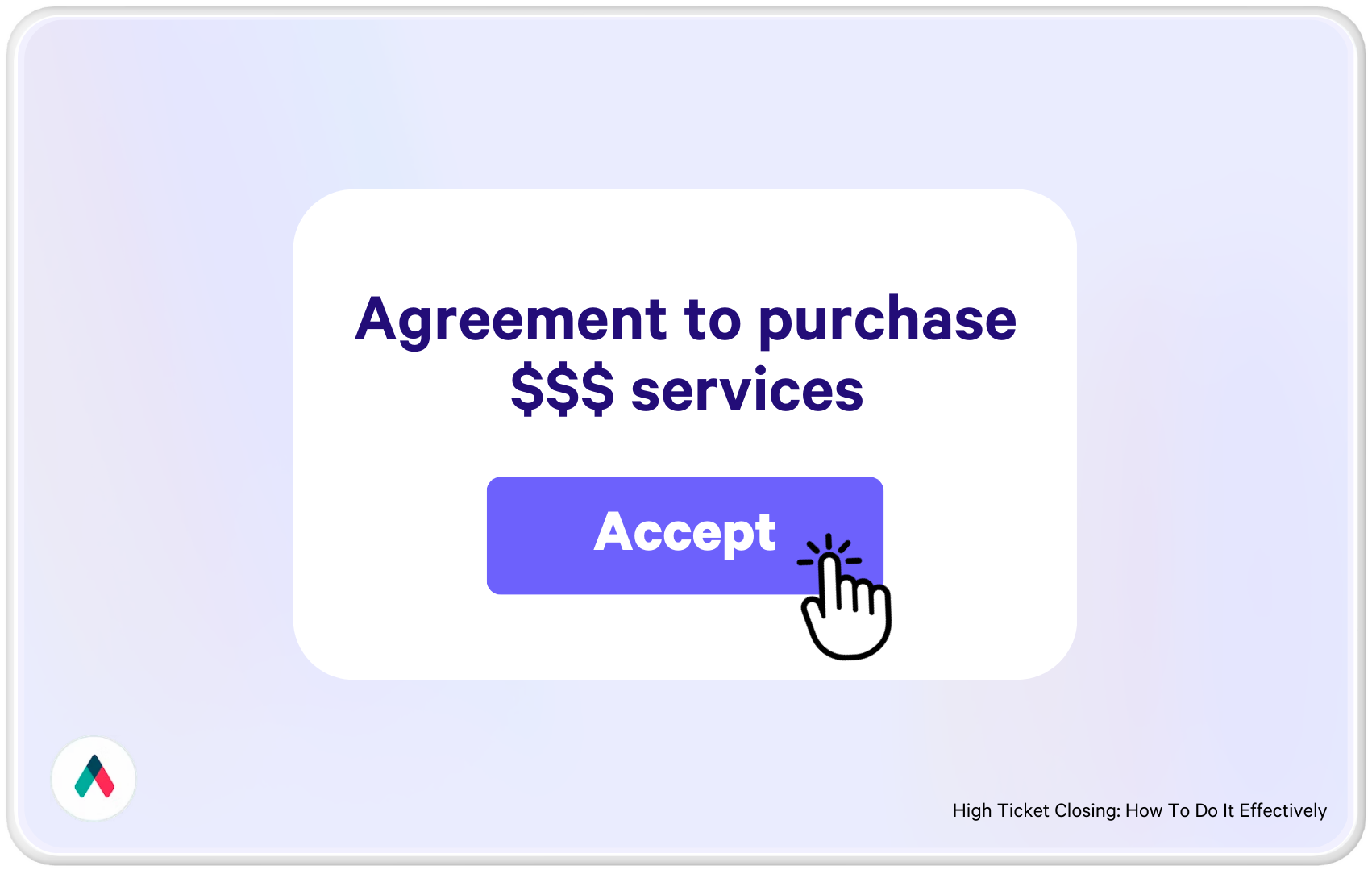
Here are eight questions high-ticket closers can use to engage leads and close sales effectively:
1. What challenges do you anticipate in implementing our solution?
This question helps uncover any potential roadblocks early on, allowing you to address them proactively and show the prospect that you're committed to their success.
2. What differentiates our solution from others you have considered?
This question allows the prospect to share their perceptions of your offering, providing insight into what they value and how you can better position your product or solutions.
3. How do you measure success concerning our product or service?
Understanding the prospect's metrics for success allows you to align your offering with their goals and demonstrate how you can drive the results they're looking for.
4. What is your timeline for making a decision?
You can gauge the prospect's urgency and adjust your follow-up strategy accordingly by asking this. It also helps manage expectations on both sides.
5. Who else is involved in the decision-making process?
This question helps you understand the dynamics of the buying process and ensures you're engaging all key stakeholders. It also helps you correctly assess how long the sales cycle will be and how much push you need to apply.
6. Can you help me understand the impact of the problem you're trying to solve?
This question drives at the heart of the value your solution can provide, encouraging the prospect to consider the cost of inaction or sticking with the status quo. It's likely you already know what impact your solution can have, but hearing it from the prospect's point of view can be more impactful -- and it can allow you to segue into showcasing the benefits of your product/ service.
7. What experiences have you had with similar products/services in the past?
This question can uncover any past disappointments or successes, helping you to shape the conversation around how your offering is different or similar.
8. If we were to move forward together, what do you see as the next steps?
This question not only expresses your enthusiasm in working with the prospect but also encourages them to visualize the path forward, making the prospect of closing more tangible.
Personalization in high ticket sales
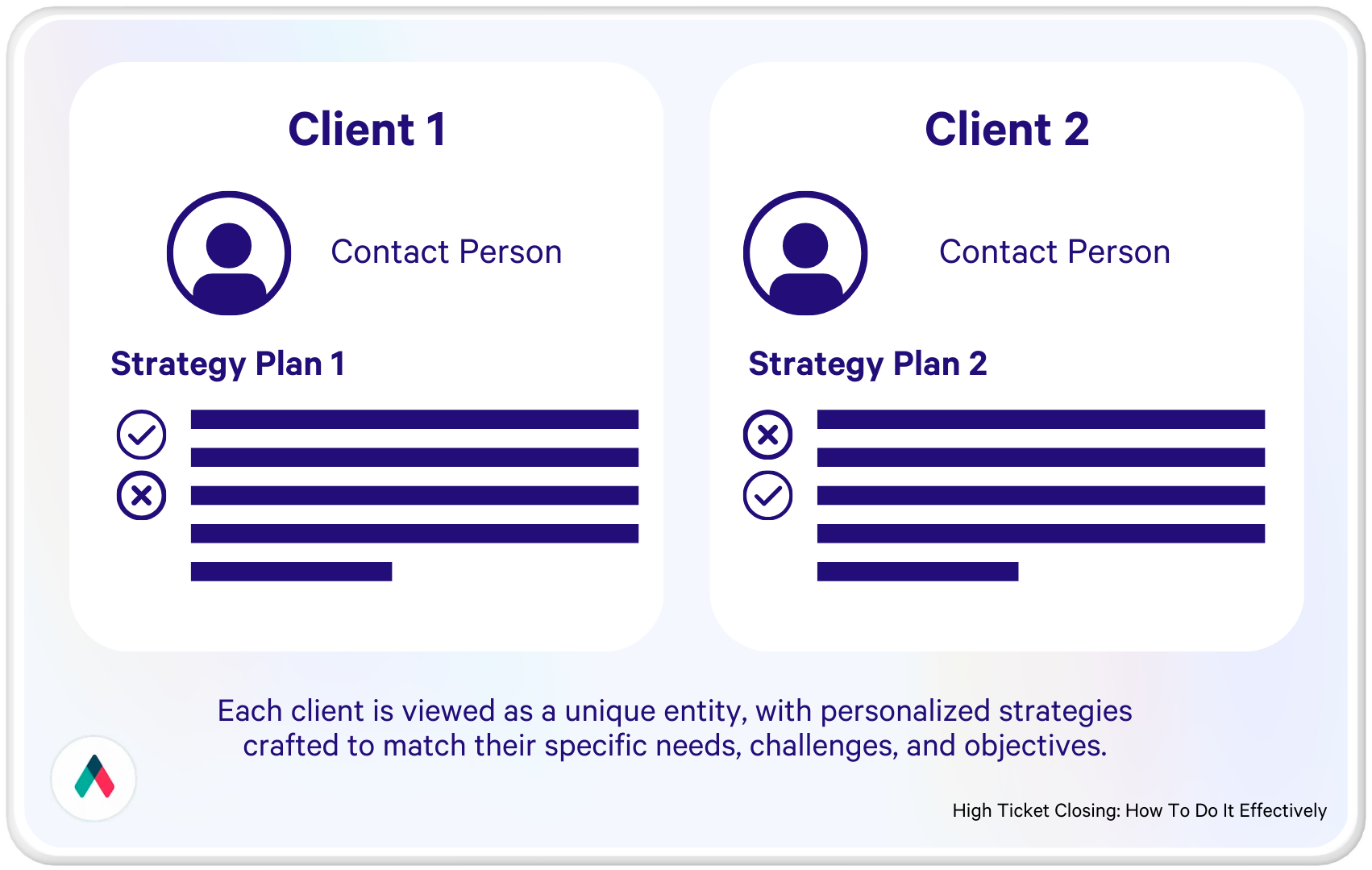
In high ticket sales, personalization is a distinct and intricate process, starkly different from the transactional approaches common in high-volume sales environments. Here, each client is viewed as a unique entity, with personalized strategies crafted to match their specific needs, challenges, and objectives.
This approach is exemplified by many companies adopting an account based sales approach, where the focus is on engaging clients through 1:1 tailored interactions. Unlike traditional sales strategies that might rely on generic or lightly personalized email templates, an ABS approach requires in-depth research to understand each prospect’s unique business landscape, thereby facilitating communications and solutions that deeply resonate with each client's specific circumstances.
Plus, the depth of personalization in high ticket sales goes beyond the crafting of initial communications. It encompasses a continuous relationship-building process that extends well beyond the initial sale. This ongoing engagement is characterized by a keen understanding of the evolving needs of the client. Sales professionals in this arena are expected to keep abreast of changes and developments within the client's industry, offering regular updates and insights that are relevant to their business growth. By doing so, they ensure that the client feels consistently supported and valued, nurturing a relationship that is not just transactional but evolutionary in nature.
Such an approach in high ticket sales is crucial because it lays the foundation for a long-term partnership. It positions the sales professional not just as a vendor, but as a trusted advisor who is genuinely invested in the client's success. This level of personalization and ongoing engagement is key to building lasting relationships in high ticket sales, where the stakes, both in terms of investment and expectations, are significantly higher than in typical transactional sales environments.
Tools for high ticket closing
The right tool stack can help you close faster, more, and better. Here are some of the best sales tools to help with that:
CRM (customer relationship management) software
A good CRM can help you manage leads, track interactions, and keep all relevant information about your prospects in one place. This not only makes it easier to stay organized but also helps you tailor your approach based on the prospect's history and past interactions with members of your team (marketers, appointment setters, referral partners).
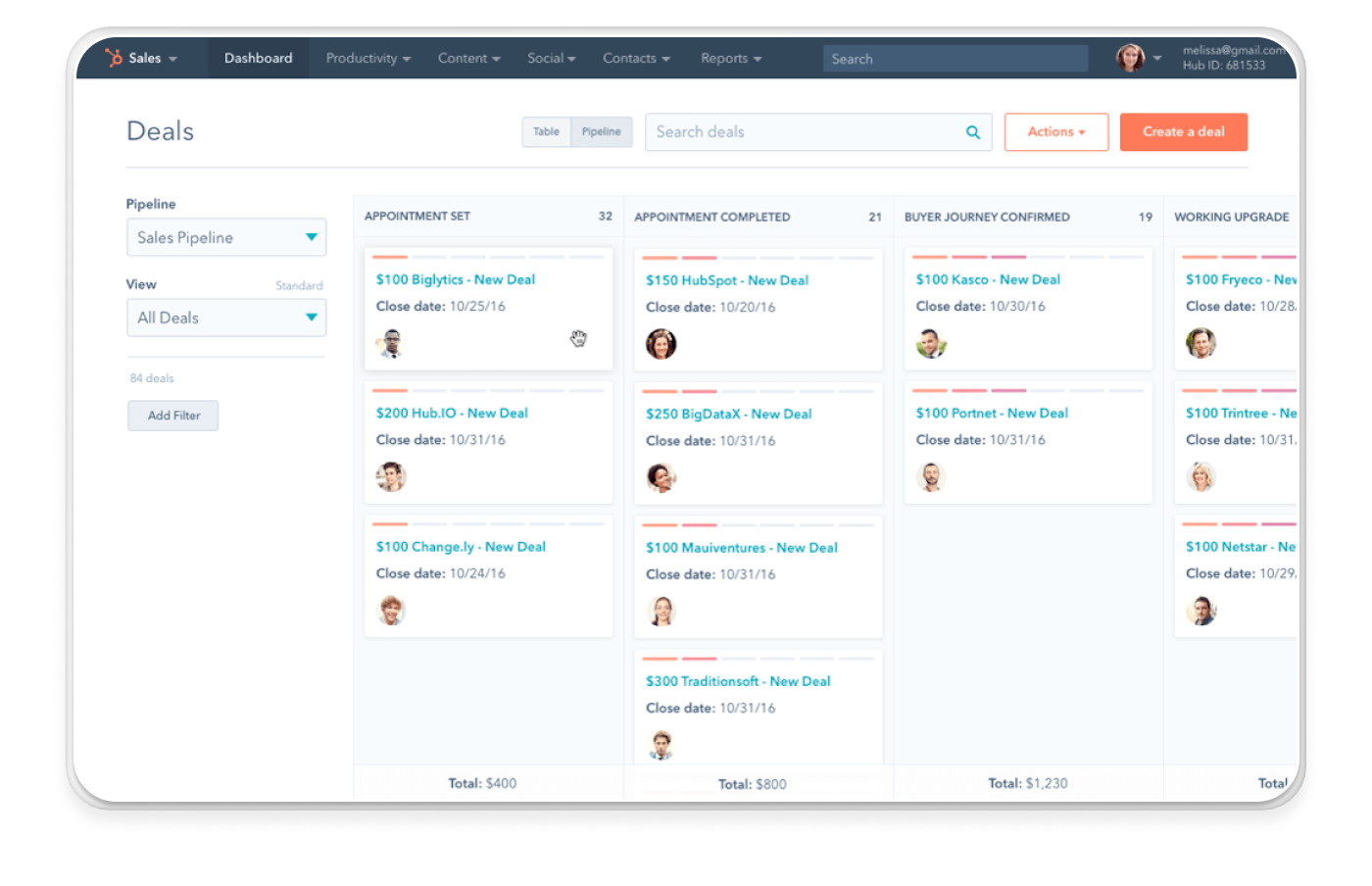
Sales proposal software
Using proposal management software helps you fast-track the sales process by providing professionally designed proposal templates, customization options, and eSignatures. This can save you time and enhance your professionalism. For example, Qwilr can help you create beautiful and interactive sales proposals that stand out.
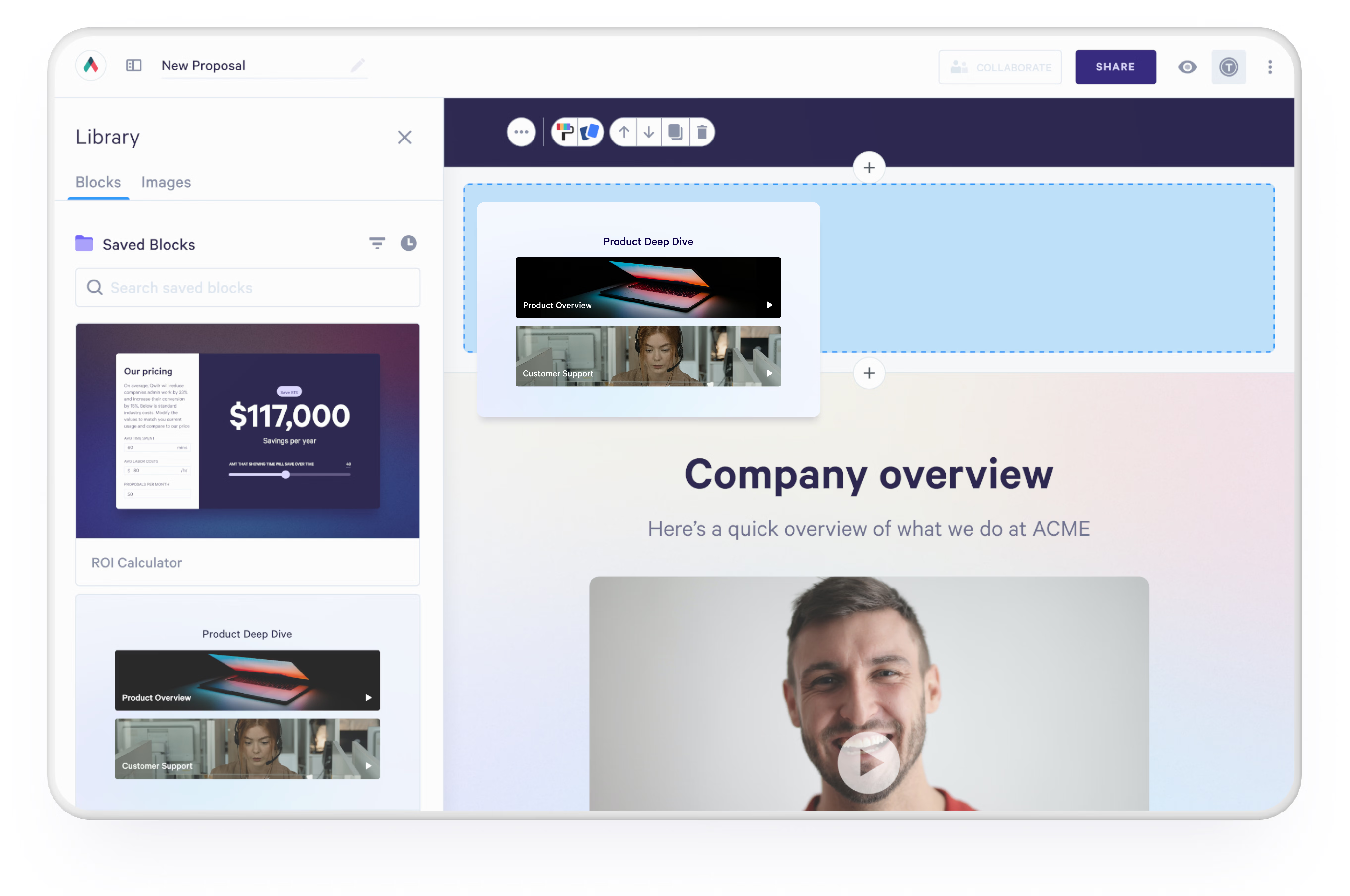
Online meeting software
Meeting face-to-face is not always possible, especially for high ticket deals. Tools like Zoom or GoToMeeting allow you to easily conduct virtual meetings, including screen sharing and recording options.
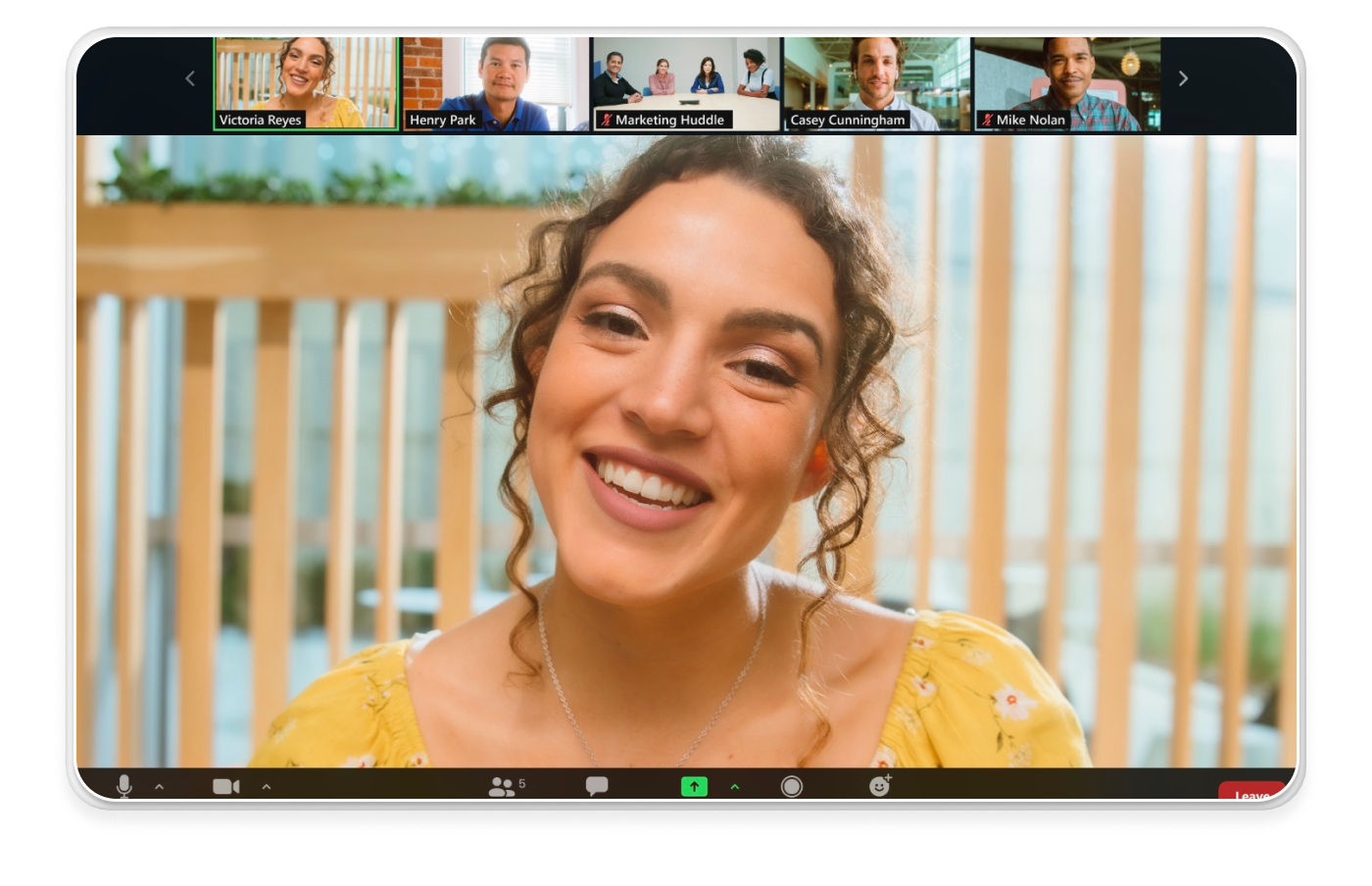
Appointment scheduling software
Having an easy-to-use appointment scheduling tool can help you schedule meetings with prospects quickly and efficiently. This also minimizes back-and-forth emails and allows you to focus on selling rather than coordinating schedules. Popular tools include Calendly, Acuity Scheduling, and others.
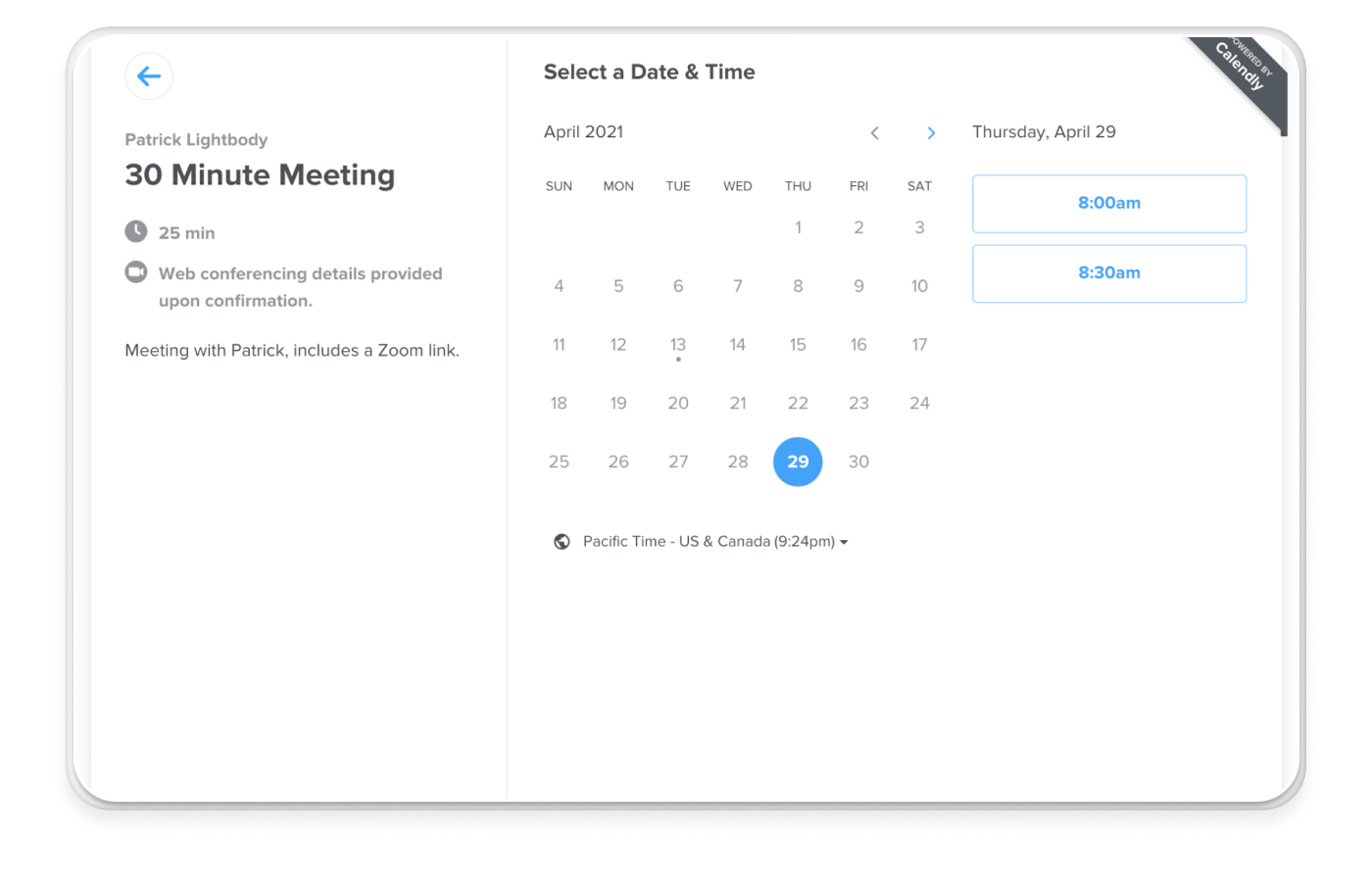
Social proof in high ticket sales
In high ticket and enterprise sales, social proof plays a pivotal role. It’s not just about showcasing generic case studies and testimonials for buyers to 'tick a box' against.
Instead, it involves highlighting experiences from industry leaders, competitors, or peers, and in turn, building trust and credibility. The goal is to give prospects the confidence that your solution is not just a product but a pathway to solving their most pressing challenges.
Client testimonials and case studies
The power of client testimonials and case studies in high ticket sales lies in their specificity and relevance. Generic endorsements don’t suffice. Instead, what’s needed are detailed accounts of how your solution has addressed specific problems, preferably those that mirror the prospect’s situation.
Testimonials from recognized industry leaders or direct competitors carry significant weight, as they serve as a benchmark for the prospect, offering assurance that your solution is tried, tested, and trusted.
Media recognition and industry awards
For larger organizations, the value of media recognition and industry awards becomes increasingly significant. Just as the adage goes, "no one got fired for hiring McKinsey," your brand needs to be perceived as a 'safe bet.'
Recognition from reputable industry bodies or media outlets positions your brand as a leading authority, reducing perceived risks associated with high ticket purchases. This form of social proof is essential in reinforcing the idea that choosing your brand is not just a wise decision but a standard for excellence in the industry.
Determining if high ticket closing is the right move in your career
Many sales professionals look at high-ticket selling with much trepidation, but it doesn't have to be overwhelming. It can be a great next step in a sales career and a great place to gain excellent experience, work with a variety of customers, and earn a living.
But, you can't do this alone. High ticket selling requires resilience, good processes, excellent tools, and, most importantly, a willingness to learn and adapt. High-ticket closers can effectively navigate the complex landscape of high value sales and achieve success by asking the right questions, building relationships, and leveraging the right tools.
So go out there and start closing those high ticket deals! Overall, mastering high ticket closing skills takes time and effort, but it can be extremely rewarding both financially and professionally.
About the author

Brendan Connaughton|Head of Growth Marketing
Brendan heads up growth marketing and demand generation at Qwilr, overseeing performance marketing, SEO, and lifecycle initiatives. Brendan has been instrumental in developing go-to-market functions for a number of high-growth startups and challenger brands.
FAQs
High ticket closing refers to the process of selling high-priced products or services that require a significant financial investment from the buyer. Unlike low-ticket items, which are often purchased impulsively or out of necessity, high-ticket items require a more personalized approach, longer sales cycles, and more convincing and nurturing. Examples of high-ticket items include luxury goods, boutique consulting services, and custom software.
The main difference between high ticket and low ticket closing lies in the cost of the product or service being sold. High ticket closing involves selling expensive items that require significant buyer investment and often a longer sales cycle. This type of sale requires building trust, nurturing relationships, and detailed presentations or demonstrations. In contrast, low ticket closing involves selling lower-cost items that are often purchased on impulse and require less convincing, usually through a quick pitch or demonstration.
To become a successful high ticket closer, several essential skills are needed:
- Confidence and Charisma: Genuine self-assurance and charisma help build trust and credibility with prospects.
- Understanding Client Needs: The ability to deeply understand and anticipate the client's needs and pain points.
- Communication: Excellent communication skills, including active listening, brevity, and compelling presentation abilities.
- Negotiation and Persuasion: Skilled in negotiating terms and pricing, and using persuasive techniques to close deals.
- Closing Strategies: Knowledge of various closing strategies and knowing when to apply them, such as trial closes, assumptive language, or creating a sense of urgency.

